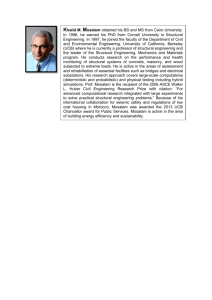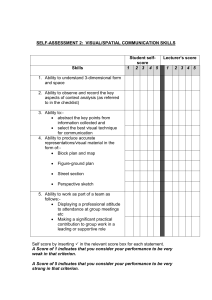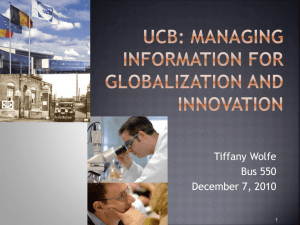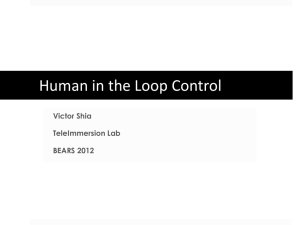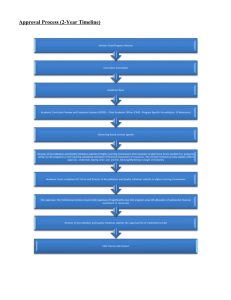presentationJan2010 - University of Colorado Boulder
advertisement
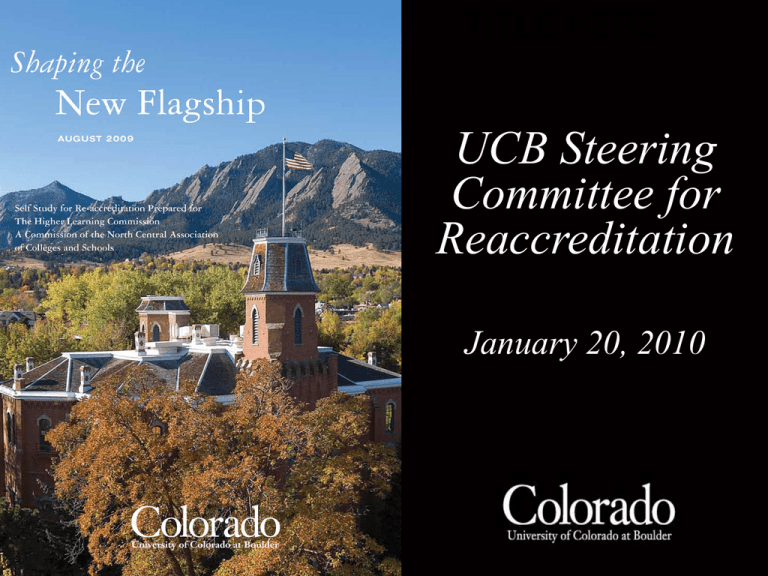
TITLE HERE UCB Steering Committee for Reaccreditation January 20, 2010 Today We Will Discuss • Accreditation and the Higher Learning Commission (HLC) of the North Central Association (NCA) • The criteria and process for accreditation • The UCB Self Study process to date • The role of the UCB Steering Committee • Plans for the Site Team visit 1 Accreditation is About… • Verifying that institutions meet standards established by their peers • Promoting institutional self knowledge and advancement • Providing assurances to the public about quality • Building and maintaining confidence in higher education • Allows students to receive federal financial aid • Facilitates transfer of academic credit 2 The University of Colorado at Boulder • First accredited in 1913 • Ten-year cycle for reaccreditation • Higher Learning Commission of the North Central Association (www.ncahlc.org) • Scheduled for reaccreditation in 2010 • HLC/NCA Site Team visits Feb. 22-24 3 UCB Self Study/Accreditation Timeline • Nov. 2007: Flagship 2030 approved by the Board of Regents • June 2008: Self Study Planning Board appointed, work begins on drafting report • Jan. 2009: Chancellor appoints UCB Steering Committee for Reaccreditation • Aug. 2009: Content of Self Study report is finalized “as of” Aug. 1 • Nov. 2009: Final Self Study report is completed and sent to HLC • Feb. 2010: HLC/NCA Site Team visit Feb. 22-24 • March 2010: “Error of Fact” review • April 2010: HLC sends final report 4 Next Steps for the Steering Committee • Read and mark up the Self Study Report, “Shaping the New Flagship” • Read the Accreditation Briefing Document • Both posted on the official website for accreditation: www.colorado.edu/accreditation • Prepare for Site Team visit 5 Self-Study Summary Chapter 1: Introduction • Brief summary of the university’s history • Current “snapshot” of the university • Major developments since the last reaccreditation a decade ago • Strategic planning • State’s role in higher education • Managing growth and financial challenges • Improving physical infrastructure • Faculty and student achievements 6 Chapter 2: 2000 NCA Review Progress Report Suggestions • Reorganize administration • Improve student advising and auditing • De-couple capital campaign Concerns and Recommendations • Enhance diversity planning • Retain top faculty • Expand physical plant • Institutionalize assessment 7 Chapter 3: Flagship 2030 Serving Colorado, Engaged in the World • 8 Core Initiatives • 10 Flagship Initiatives • Next steps in a challenging economy • Begin implementing selected initiatives • Allow room for flexibility and stress agility 8 Criteria for Accreditation 1. Mission and Integrity 2. Preparing for the Future 3. Student Learning and Effective Teaching 4. Acquisition, Discovery, Application of Knowledge 5. Engagement and Service 9 Chapter 4: Mission and Integrity (Criterion 1) Operate with integrity to fulfill mission • 1A: Mission documents are clear and publicly articulate commitments • 1C: Understanding and support of the mission is pervasive • 1E: UCB upholds and protects its integrity • 1D: Governance and administration promote effective leadership and collaboration to fulfill the mission • 1B: Recognizes the diversity of its learners and those it serves 10 Chapter 4: Mission and Integrity - continued Operate with integrity to fulfill mission Key strengths • Mission-driven planning • Integrity as a core value • Organizational stability • Shared governance Challenges and Issues • Setting priorities and sustaining focus • Creating a more diverse and welcoming community 11 Chapter 5: Preparing for the Future (Criterion 2) Capacity to fulfill mission, improve education, respond to challenge •2A: UCB prepares for a future shaped by societal and economic trends •2D: Planning aligns with mission •2B: Resources support educational programs and ability to strengthen them in the future •2C: Assessments provide reliable evidence of effectiveness and continuous improvement. 12 Chapter 5: Preparing for the Future - continued Capacity to fulfill mission, improve education, respond to challenge Key strengths •Alignment of strategic planning •Remarkable achievement with limited resources Challenges and Issues •Sustaining Excellence •Funding Flagship 2030 initiatives •Supporting the research enterprise •Gaining clarity on the university’s role 13 Chapter 6: Student Learning and Effective Teaching (Criterion 3) Evidence of student learning and teaching effectiveness •3A: Goals for learning outcomes are clearly stated •3C: UCB creates effective learning environments •3B: UCB values and supports effective teaching •3D: Learning resources support student learning and effective teaching 14 Chapter 6: Student Learning and Effective Teaching - continued Evidence of student learning and teaching effectiveness Key strengths •Commitment to effective teaching •Array of innovative learning opportunities Challenges and Issues •Momentum in student learning assessment •Evolution of the university library •Enhancing the physical campus 15 Chapter 7: Acquisition, Discovery and Application of Knowledge (Criterion 4) Support life learning for students, faculty, staff through inquiry, creativity and practice •4A: UCB demonstrates that it values a life of learning •4D: UCB provides support to ensure faculty, staff and students acquire, discover and apply knowledge responsibly •4B: UCB demonstrates intellectual inquiry is integral to educational programs •4C: UCB assesses usefulness of curricula to students in a global, diverse and technological society 16 Chapter 7: Acquisition, Discovery and Application of Knowledge - continued Support life learning for students, faculty, staff through inquiry, creativity and practice Key strengths •Highly productive and innovative research enterprises •History of interdisciplinary engagement •Strategic and bold initiatives •Effective partnerships with federal laboratories •Growth in tech transfer 17 Chapter 7: Acquisition, Discovery and Application of Knowledge - continued Support life learning for students, faculty, staff through inquiry, creativity and practice Challenges and Issues •Support for research •Research infrastructure •Curricular review •Internationalizing the university •Increasing graduate enrollment 18 Chapter 8: Engagement and Service (Criterion 5) UCB serves its constituents in fulfilling its mission •5A: UCB analyzes constituents’ needs and expectations •5B: UCB is committed to engaging with its constituents and communities •5D: Internal and external constituents value the services UCB provides •5C: Demonstrates responsiveness to constituents 19 Chapter 8: Engagement and Service - continued UCB serves its constituents in fulfilling its mission Key strengths •Strong commitment to engagement •Community service •Reciprocal benefits Challenges and Issues •Coordination and communication •Recognition in faculty processes •Assessment methods 20 Chapter 9: Request for Continued Accreditation • The process of re-accreditation is self reflective and defines our future • UCB has responded to concerns raised by the HLC/NCA evaluating team in 2000 • Flagship 2030 informed the Self-Study review • Appendices • Campus map • Organizational charts • Federal compliance summary • Specialized accreditation • Resource room examples • Fall 2009 enrollment 21 The Site Team’s Visit • Monday Feb. 22 through Wednesday Feb. 24, 2010 • Opening meeting Monday morning • Exit conference Wednesday noon • Teams comprised of 14 members from peer institutions • Schedule is determined by the Site Team Chair and finalized by mid-February. • Team members interview, look for evidence, cross-reference, and ask lots of questions 22 HLC/NCA Site Team Members and Assignments Dr. Nancy Ellen Talburt (Team Co-Chair) Vice Provost for Academic Affairs, Univ. of Arkansas Dr. Mark S. Wrighton (Team Co-Chair) Chancellor, Washington University, St. Louis Criterion 1: Mission and Integrity Dr. W. Randy Smith Vice Provost, Ohio State University Dr. Lon Kaufman Vice Provost, Univ. of Illinois, Chicago 23 HLC/NCA Site Team Members and Assignments Criterion 2: Preparing for the Future Dr. David C. Bosserman VP Administration & Finance, Oklahoma State Natalie Krawitz VP Finance & Administration, Univ. of Missouri Dr. Morteza A. Rahimi VP Information Technology, Northwestern Criterion 3: Student Learning Dr. Elaine M. Klein Assistant Dean & Director, Univ. of Wisconsin Dr. Ben A. van der Pluijm Senior Counselor to Provost, Univ. of Michigan 24 HLC/NCA Site Team Members and Assignments Criterion 4: Acquisition, Discovery and Application of Knowledge Dr. George E. Walker VP Research and Grad. Studies, Cleveland State Dr. Peggy F. Harrel Director Grad. Studies, Univ. of Southern Indiana Dr. Rex D. Ramsier Associate Provost, Univ. of Akron Criterion 5: Engagement and Service Dr. Kenneth J. Moore Professor Agronomy, Iowa State Dr. Thomas L. McPhail Professor Media Studies, Univ. of Missouri 25 Aspects of the Site Team Visit • Large group meetings for all Site Team members • Opening meeting with campus leadership • Budget update and briefing • Exit conference with Chancellor • Small group meetings by Criteria and Components • Special focus small group meetings (e.g. Internationalization) 26 Aspects of the Site Team Visit - continued • Campus Hosts for each Criterion • Criterion 1 John Sleeman • Criterion 2 Steve McNally • Criterion 3 Mike Grant • Criterion 4 Russ Moore • Criterion 5 Anne Heinz • Open forums for faculty, staff, students and alumni 27 Logistics • Site Team members will be headquartered in ATLAS • Meetings will be held in surrounding buildings • 4 - 10 campus people in each meeting • All Vice Chancellors, Deans and Department Chairs included • Site Team members will lead each meeting • Focus on questions and verification 28 Next Steps • Develop master schedule for Site Team visit • Contact and schedule campus faculty, staff, students and administrators • Read the Self Study report, Shaping the New Flagship • Review the Accreditation website www.colorado.edu/accreditation • Next briefing • Wednesday, February 17, 2010 • 10am – 12pm • UMC Aspen Rooms 29
